# 22 Far Less than Everything You Wanted to Know about Rome
On the Latin Language, Sex Education, Death, Life, and Art
A so-called dead language became part of my life when I was twelve years old. Decades later, it still shapes my thoughts and understanding.
But Latin never felt dead to me. Its regular grammar was a system that gave me control and its beautiful words promised conjuration. What more can you want as a child? Learning Latin was like receiving a secret blueprint to the world.
I imagine this is how young scientists feel when they first encounter math, or born musicians when they hear Bach. A language helps us make sense of a world that so far has seemed chaotic.
Poet Anne Carson captured it beautifully when speaking about learning Greek as a child:
“I don’t know every language in the world—maybe if I knew Sanskrit and Chinese I would think differently—but there’s something about Greek that seems to go deeper into words than any modern language. So that when you’re reading it, you’re down in the roots of where words work, whereas in English we’re at the top of the tree, in the branches, bouncing around. It was stunning to me, a revelation. And it continues to be stunning, continues to be like a harbor always welcoming. Strange, but welcoming.” (The Paris Review, The Art of Poetry Interview No.88)
When I asked myself why I wanted to write about Rome, despite my recent disenchantments—the tourist crowds, the scaffolding, the traffic, the construction work—I realized it was Latin. Not Italian, which is fun to practice with the baristas, but classical Latin, the language I only share with men long dead. So instead of taking you on a journey through the congested city, I’m taking you on a 6-stop journey through time and words.
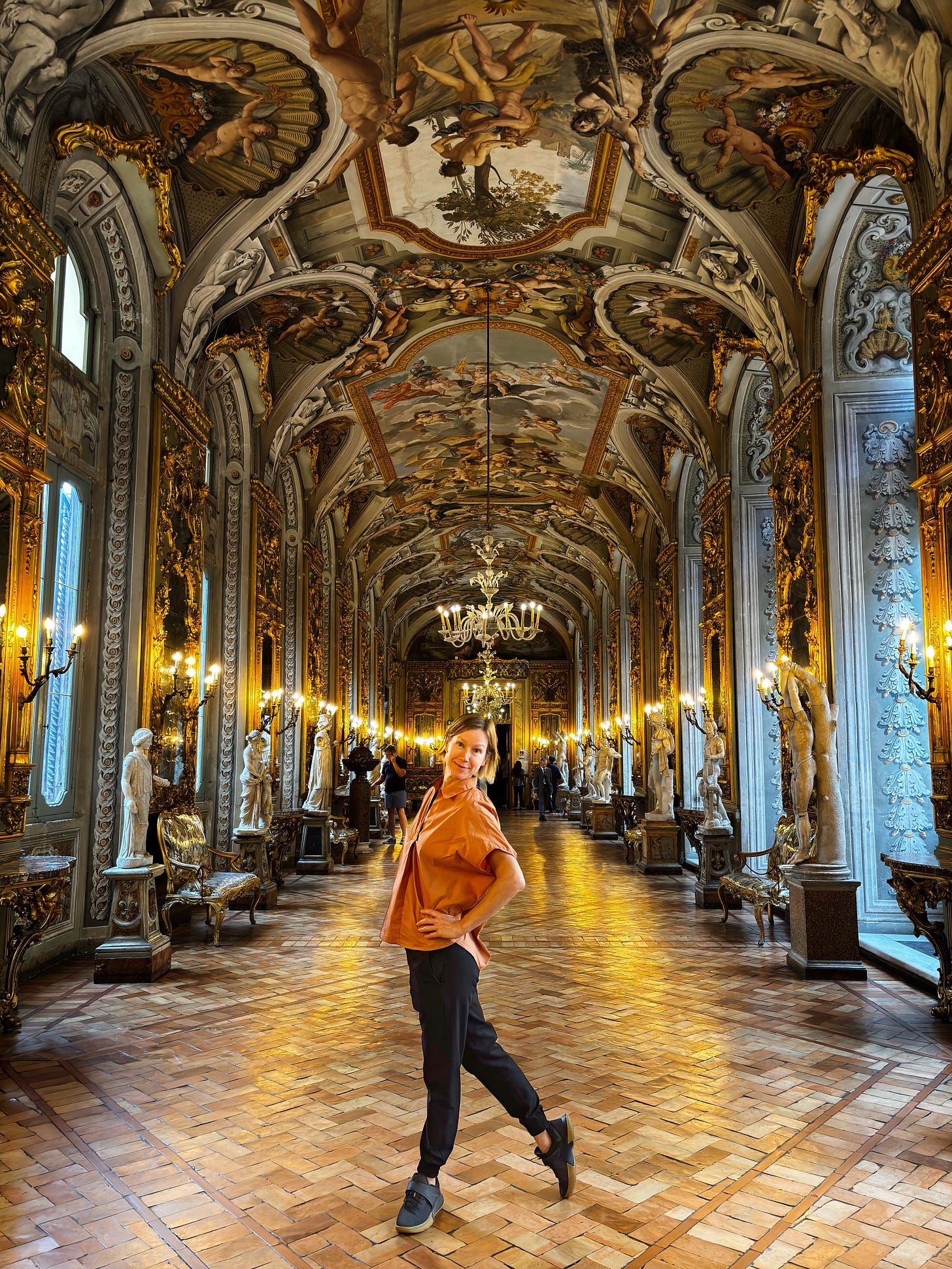
1. Alter Ego
The first time I came to Rome was with my Latin teacher and my high school classmates sometime in June 1994. It was a tradition at our Dutch school to travel to a classical city after the final exams and before the results were in to take the sting out of waiting.
My head was filled with history. We’d been reading a lot of Tacitus and Cicero over the years, and exploring the Forum Romanum was like traveling back in time. It was all so real! Some buildings had dwindled down to a few tall columns, but my imagination built them back into full-blown structures and made them the settings of fascinating events. So much I’d learned in school had been abstract to me—math, the British society of Elizabeth Bennet—yet here I was, touching stone, putting my hands on smooth marble.
I remember climbing onto stump of column. I was a rather shy girl at the time, perhaps I still am, yet I loved theater and had no problem imagining myself as a powerful orator delivering my speech to the world. For a moment, I was Cicero.
2. Non Consensus
During the same trip to Rome as a high school student I was groped by an Italian man. He was walking toward me in broad daylight on a busy street and literally grabbed me by the pussy.
I did not scream for help. I was too shocked to do anything. By the time I fully realized what had happened, the man was long gone.
From that moment on, I asked a boy in my class to chaperone me. Each time I left the hotel, I held his hand and pretended to be his girlfriend. The boy was happy to comply, happy to be of service or hoping that our pretense would one day become a reality.
I had not evaded unwanted sexual attention or harassment until this trip to Italy. I believe very few girls and women do. Yet this shameless groping in Rome was a wakeup call nonetheless, a moment of sexual education. Gender norms and threats differ from country to country. Macho culture is no joke.
3. Momento Mori
The second time I came to Rome was in the summer of 2000. I was there with Daniel (my now husband) on our first holiday together. We’d just spent a week in a tiny village—Santa Apollinaire—where over many glasses of Chianti and grappa, we’d discussed our fears and ambitions, trying to figure out in what kind of shared future we would both thrive.
In our hotel room in Rome, we spoke of death. Daniel, in his rock-and-roll manner yet not truly joking, said he would die young and go out with a bang. I cringed at the thought of his untimely death. I’d lost my father six months before and had witnessed my stepmother’s grief.
“Will you consider staying alive for me?” I asked.
When Daniel realized I was serious, he dropped his bravado and said, “Yes.”
4. Carpe Diem
It took over a decade to return to Rome. Daniel was a bit of a workaholic and probably I was, too, spending long days at my desk, writing. But the desire that would later help us become nomads, the desire to spend more time just being alive, was already present, and we started to learn how to seize opportunities. So when Daniel’s aunt and uncle from Florida announced they would travel to Rome and hoped to see us there, we spontaneously booked a trip.
Why not? we said. We only live once.
What I remember most from this visit was eating artichokes Roman style. I enjoyed touching my food, plucking the harder, outer leaves off one by one and dipping them into the aioli before slicing into the soft, juicy heart. It was a feast, it was a day well-seized.
5. Introspectio in Museum
Now, three decades after my first visit to Rome, I come to the city once a week. I temporarily live 40 km north of Rome in the castle town Bracciano and the train to the Valle Aurelia station near the Vatican takes about an hour.
One day, after reading
’s piece about the Palazzo Doria Pamphilj, I decided to have a look. The extensive art collection containing several Caravaggios and Brueghels, a Raffaello, a famous Velasquez, and even a Rembrandt, is housed in the same aristocratic palace in which the paintings and sculptures were first accumulated.I walked through the original hallways of the gallery and visited other rooms of the palace, the ballroom, the bedrooms, and the chamber reserved for the pope. The audioguide written from the perspective of a family member, let me pretend that I was a guest to this home rather than a paying customer.
The painting that touched me the most, that made me go inward and pause at the less conscious parts of my mind, was about perception and light. About how it may look to others when we illuminate our path.
The shadows we cast can be larger and draw more attention than the small careful movements we intend to make.
6. Ad Infinitum
My teenage love for Latin has never left me. I remember a discussion I had with one of my first editors on the use of “ergo” in my manuscript. She thought it sounded forced, unnatural, whereas I argued that this was my character’s voice, her affectation.
I still add Latin words to my stories whenever I can. What text doesn’t improve with a Mea Culpa, a Vice Versa, a Bona Fide, a Verbatim, an Alibi, or an Etcetera?
Some words are harder to weave into a piece than others, yet I gladly make the effort. Be honest, don’t you just feel better after reading Facsimile, Crepuscular, or Ad Infinitum?
Desk Journeys aka Reading Recommendations
While in Italy, I read Italian authors to feel even more at home. There are many I could recommend, yet I’m giving you Antonio Tabucchi (Pisa, 1943—Lisbon, 2012) now because I’m currently reading his excellent story collection Message from the Shadows.
Years ago, I immensely appreciated Time Ages in a Hurry, another one of his short story collections. Tabucchi’s characters all struggle to escape from a present that’s hard to bear because of what’s happened in the past, and they must use their intuition to free themselves from false beliefs or uncover something that will help them cope.
One of my favorite Tabucchi books is Pereira Maintains, a novel set in Lisbon, where I first read it. If I ever teach a class on postmodern European literature in translation this title would be on my list. Pereira Maintains is about a journalist who fails to notice the menacing cloud of fascism and denies his responsibility in the world, until he slowly has a change of heart.
Time to Say Goodbye
I’m still in Bracciano, Italy for a month. But in next week’s essay, I’ll take you to Sicily and write about grief and the marzipan made in an old monastery’s dolceria.
All my best,
Claire
P.S. In my last post, I asked readers to support my newsletter, and immediately three other Substack authors started to recommend Wander, Wonder, Write to their audiences. I am deeply grateful. Asking for support really works!


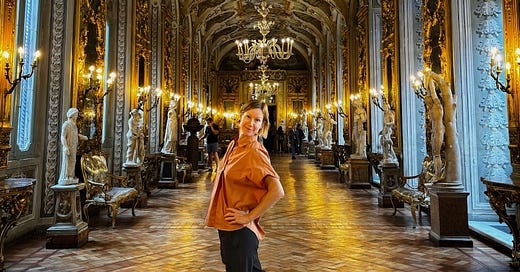


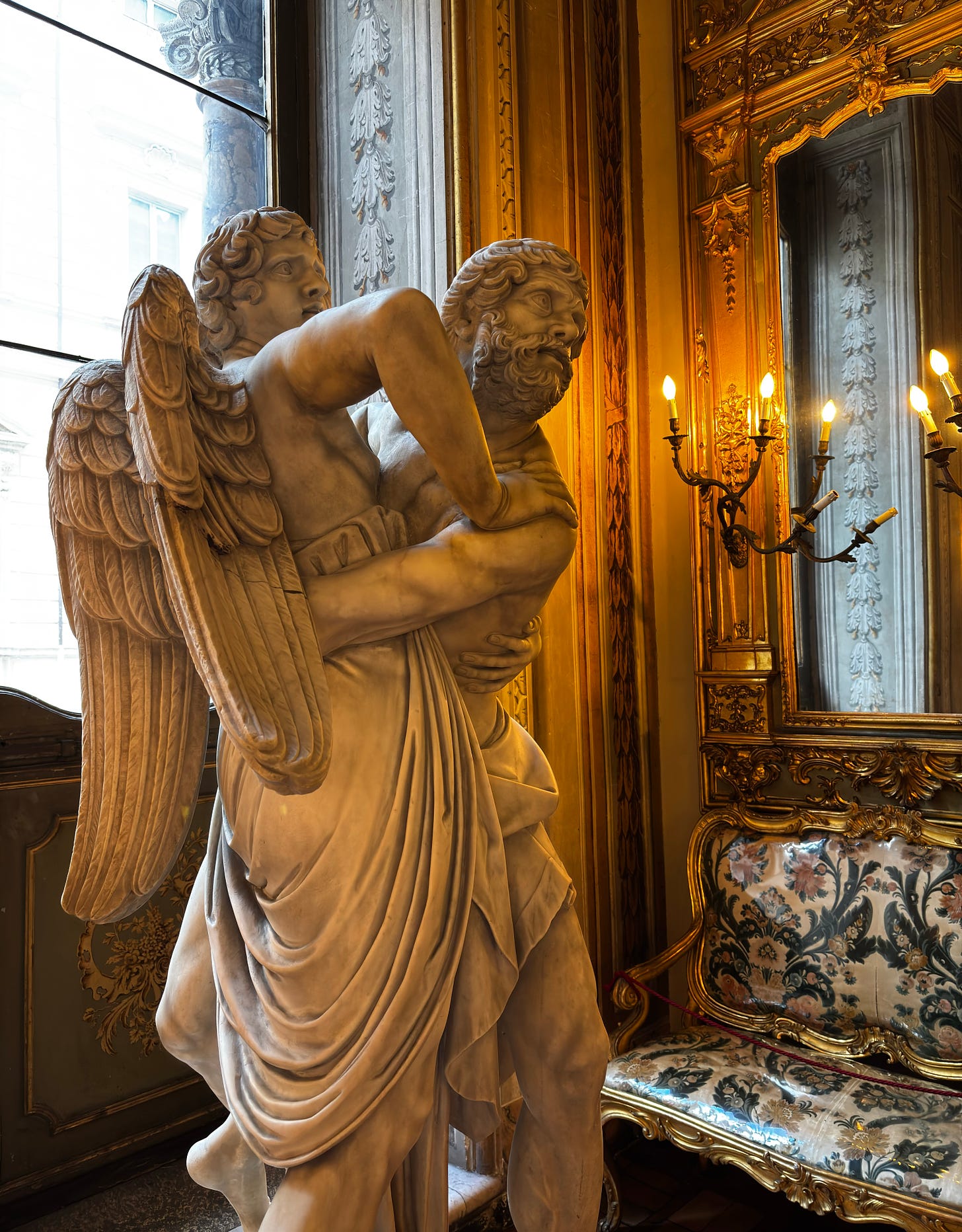
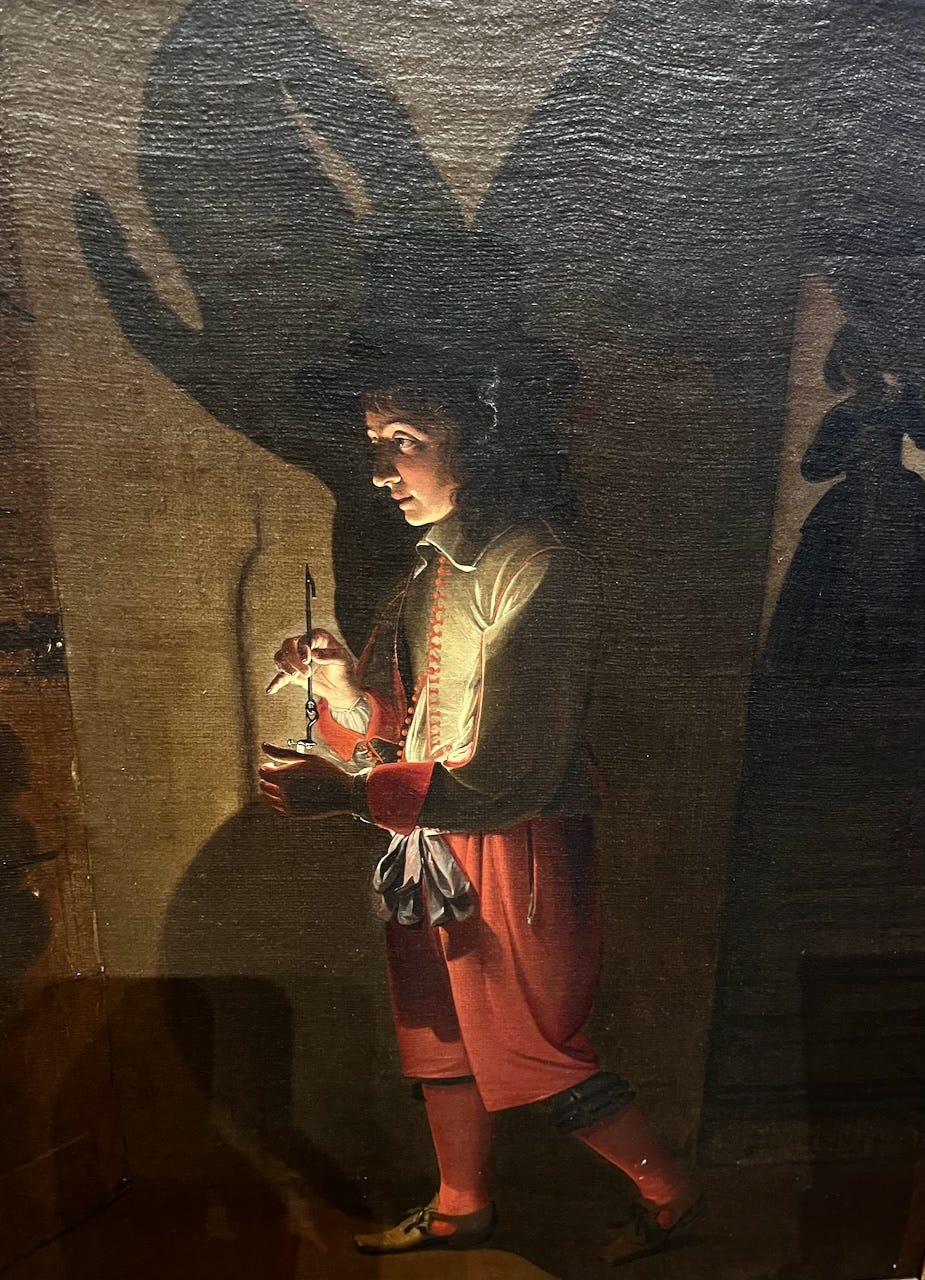
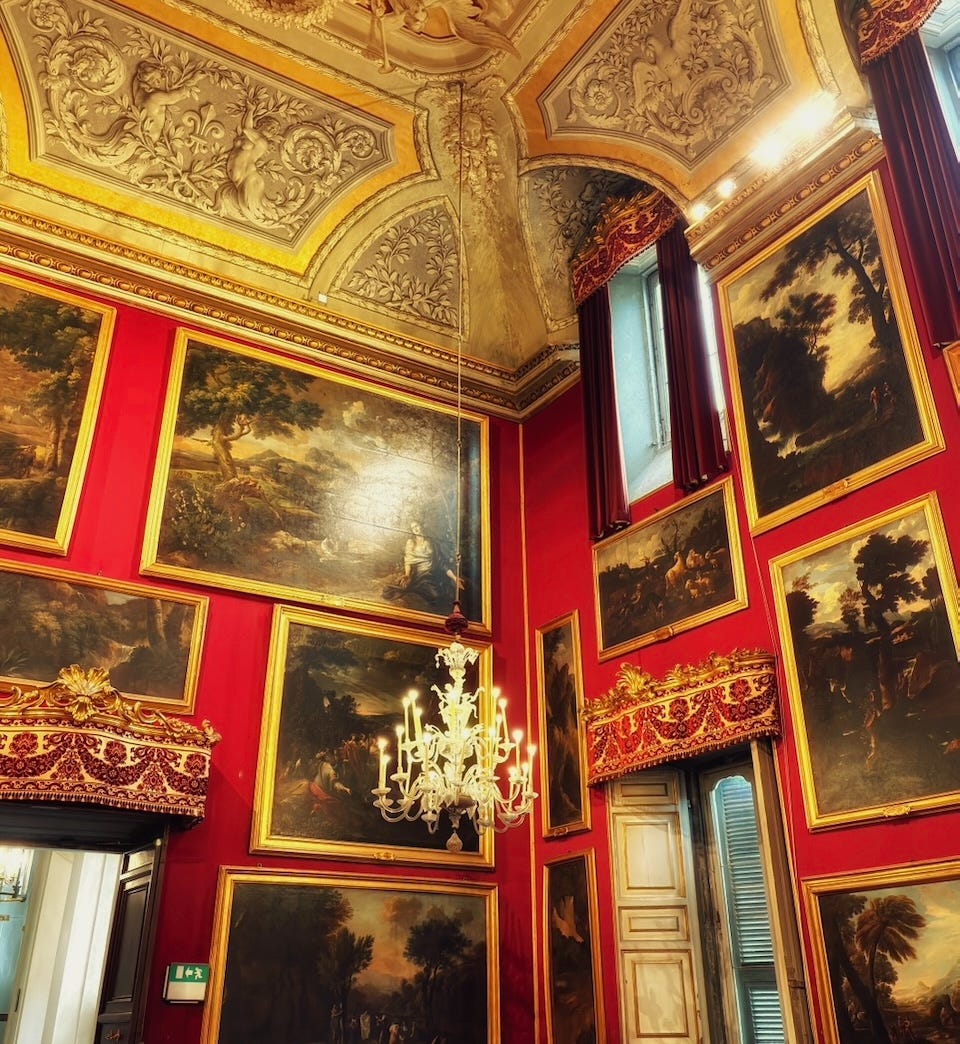
How cool you live an hour's train ride from Rome! The photos and background on the Palazzo were so interesting. What a gorgeous marvel. I never considered Latin in h.s. -- now I'm sorry I took French instead.
So nice to hear my piece inspired you! I think Palazzo Doria Pamphilj is really underrated. And by the way, I studied Latin in high school too. I don't remember much of it now, but I think it helped me learn French and Italian.